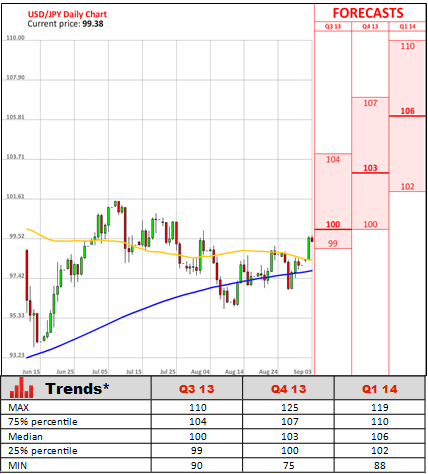Note: This section contains information in English only.

Tue, 03 Sep 2013 06:01:04 GMT
Source: Dukascopy Bank SA
"This will transpire even in the face of what is likely to be a markdown to the Fed's economic forecast. In other words, for all the talk about data dependency, whether they taper or not or how soon will not merely be about the data."
- Tom Porcelli, chief US economist at RBC Capital Markets
September is already here and for financial markets it usually means only one thing - high volatility. Despite looming confrontation in Syria, which in case of an open conflict will definitely have a negative impact on the world's largest economy, the pivotal for investors will still be the possible tapering of Fed's stimulus programme, which could be announced in the middle of the month. The third round of bond buying policy, also known as quantitative easing, is the U.S. governmental practice of injecting enormous amount of money in circulation through the purchase of financial assets. The Fed has been buying $85 billion of bonds and mortgage-backed securities per month since December 2012, and the tapering would mean an end of a 20-year U.S. bond market rally, as well as the end of extra liquidity injected into the U.S. economy that, moreover, has found its way into emerging markets as well. Historically, September was the worst month for the Dow Jones Industrial Average, which showed the worst performance during this month. In addition to that, September's volatility will have an impact on the U.S. Treasury 10-year bond yield, which has already spiked by almost 50% during the usually quiet summer months. Finally, the impact of Fed's tapering will be felt most in emerging markets, as outflows from emerging market equity funds more than doubled during the last week, reaching $3.9 billion, up from previous week's $1.7 billion. September is known as a month with an abnormally high volatility, making it more riskier, and potentially more profitable for trade.
© Dukascopy Bank SA
Actual Topics
Subscribe to "Fundamental Analysis" feed
Subscribe
Per scoprire di più sulla piattaforma di Dukascopy Bank per Forex/CFD, sul SWFX ed altre informazioni relative al trading,
la preghiamo di contattarci o richiedere di essere contattato (callback request)
la preghiamo di contattarci o richiedere di essere contattato (callback request)
For further information regarding potential cooperation,
please call us or make callback request.
please call us or make callback request.
To learn more about Dukascopy Bank Binary Options
/ Forex trading platform, SWFX and other trading related information,
please call us or make callback request.
please call us or make callback request.
Per scoprire di più sulla piattaforma di Dukascopy Bank per Forex/CFD, sul SWFX ed altre informazioni relative al trading,
la preghiamo di contattarci o richiedere di essere contattato (callback request).
la preghiamo di contattarci o richiedere di essere contattato (callback request).
To learn more about Crypto Trading / CFD / Forex trading platform, SWFX and other trading related information,
please call us or make callback request.
please call us or make callback request.
To learn more about Business Introducer and other trading related information,
please call us or make callback request.
please call us or make callback request.
For further information regarding potential cooperation,
please call us or make callback request.
please call us or make callback request.